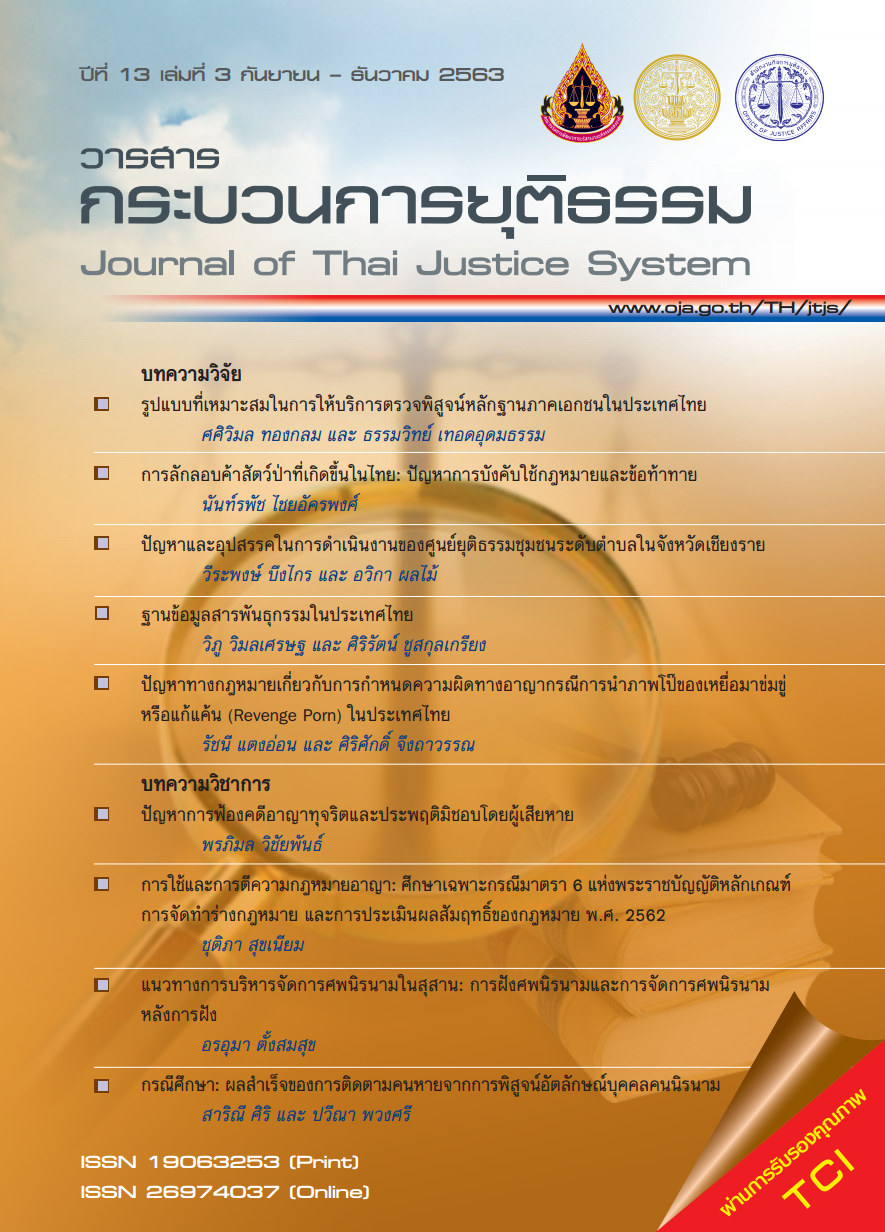ฐานข้อมูลสารพันธุกรรมในประเทศไทย
Main Article Content
บทคัดย่อ
ปัจจุบันประเทศไทยยังไม่มีฐานข้อมูลสารพันธุกรรม (DNA database) ในระดับประเทศ มีแต่เพียงฐานข้อมูลสารพันธุกรรมซึ่งรวบรวมโดยสถาบันนิติวิทยาศาสตร์ ซึ่งเป็นการเก็บรวบรวมข้อมูลสารพันธุกรรมของบุคคลเพื่อประโยชน์ในการคลี่คลายคดีอาชญากรรม การพิสูจน์บุคคลผู้สูญหาย รวมถึงการรับรองความเป็นบิดามารดา ในขณะที่หลาย ๆ ประเทศในประชาคมอาเซียนได้มีการจัดตั้งฐานข้อมูลสารพันธุกรรมในระดับประเทศ และมีการตรากฎหมายสำหรับกำหนดแนวทางปฏิบัติใน การจัดการฐานข้อมูลสารพันธุกรรมไว้เป็นเฉพาะ เช่น ประเทศมาเลเซีย สิงคโปร์ ฟิลิปปินส์ บรูไน เป็นต้น
การศึกษาวิจัยเกี่ยวกับฐานข้อมูลสารพันธุกรรมในประเทศไทยสารพันธุกรรมในประเทศไทย มีวัตถุประสงค์ คือ (1) เพื่อศึกษาแนวทางในการจัดทำฐานข้อมูลสารพันธุกรรม (DNA Database) ของประเทศไทย (2) เพื่อศึกษารูปแบบการจัดการเรื่องสิทธิมนุษยชน และสิทธิส่วนบุคคล ในส่วนที่เกี่ยวข้องกับการจัดทำฐานข้อมูลสารพันธุกรรม และ (3) เพื่อศึกษาแนวทางในการสร้างความร่วมมือระหว่างกันในประชาคมอาเซียนในการรับมือกับอาชญากรรมที่เกิดใหม่และมีแนวโน้มที่เพิ่มขึ้นในอนาคต อันเป็นการลดปัญหา การขาดข้อมูลในการติดตามผู้กระทำความผิดในคดีอาชญากรรมภายในประชาคมอาเซียน งานวิจัยชิ้นนี้ ผู้วิจัยใช้รูปแบบงานวิจัยเชิงคุณภาพ (quality research) โดยใช้วิธีการทบทวนวรรณกรรมเป็นหลัก (review literature) เนื่องจากประเทศไทยยังไม่มีการจัดตั้งฐานข้อมูลสารพันธุกรรมในระดับประเทศจึงจำเป็นต้องศึกษาถึงรูปแบบขั้นตอนในการดำเนินการ รวมถึงปัญหาและข้ออุปสรรคที่เกี่ยวข้องจากประเทศต้นแบบที่มีการจัดตั้งฐานข้อมูลสารพันธุกรรมแล้ว และประสบผลสำเร็จในการดำเนินการ ได้แก่ ประเทศอังกฤษ และสหรัฐอเมริกา เปรียบเทียบกับประเทศในประชาคมอาเซียน (AC) กำหนดรูปแบบการวิจัย ด้วย การค้นคว้าข้อมูลของประเทศในประชาคมอาเซียน (AC), อาเซียน + 3 และอาเซียน + 6 เฉพาะประเทศที่มีการจัดทำฐานข้อมูลสารพันธุกรรม ในระดับประเทศ ดังนี้ ประเทศอังกฤษ สหรัฐอเมริกา นิวซีแลนด์ ออสเตรเลีย บรูไน มาเลเซีย ฟิลิปปินส์ สิงคโปร์ จีน ญี่ปุ่น เกาหลีใต้ และอินเดีย
ด้วยสภาพสังคม ประกอบกับการเคลื่อนตัวของบุคคล ข้อมูลข่าวสารอย่างรวดเร็วในยุคปัจจุบัน ประเทศไทยควรเร่งให้มีการปรับตัวเพื่อรับมือกับปัญหาทางสังคมที่อาจจะเกิดขึ้นจากการเคลื่อนย้ายในลักษณะ Free Flow อาทิ ปัญหาแรงงานข้ามชาติ แรงงานอพยพ ปัญหาอาชญากรรมข้ามชาติ รวมถึงอาชญากรรมภายในประเทศอื่น ๆ ที่มีความเกี่ยวข้องเชื่อมโยงกัน หากไม่มีการเตรียมการรองรับอาจจะส่งผลให้เกิดปัญหาทางความมั่นคงภายในกลุ่มประชาคมอาเซียนด้วยกัน ดังนั้น ประเทศไทยเองในฐานะที่มีศักยภาพอันอาจนำไปสู่การพัฒนาเป็นศูนย์กลางด้านการขนส่ง (logistic) ในระดับภูมิภาค จึงมีความจำเป็นอย่างยิ่งที่จะต้องมีฐานข้อมูลลายพิมพ์สารพันธุกรรมแห่งชาติ (National DNA Database) และมากกว่านั้นในส่วนของประชาคมอาเซียนเองก็ควรจะมีการจัดทำฐานข้อมูลสารพันธุกรรมแห่งชาติในลักษณะเดียวกัน เพื่อให้สามารถเชื่อมโยงและแลกเปลี่ยนข้อมูลระหว่างกันได้ เช่น อย่างที่ดำเนินการในประชาคมยุโรป (EU) อันจะส่งผลให้ประเทศในประชาคมอาเซียน มีฐานข้อมูลที่ทันสมัยและสามารถรับมือกับปัญหาอาชญากรรมตลอดจนภัยคุกคามประเภทอื่น ที่อาจเกิดขึ้นในอนาคต
Article Details
ต้นฉบับที่ได้รับการตีพิมพ์ในวารสาร เป็นลิขสิทธิ์ของวารสารกระบวนการยุติธรรม แต่ความคิดเห็นที่ปรากฏในเนื้อหาของบทความในวารสารกระบวนการยุติธรรม ถือเป็นความรับผิดชอบของผู้เขียนแต่เพียงผู้เดียว
เอกสารอ้างอิง
จุฑารัตน์ เอื้ออำนวย. (2551). การสำรวจข้อมูลสถิติอาชญากรรมในประเทศไทย: ข้อเสนอเพื่อการพัฒนากระบวนการยุติธรรมยุคใหม่. วารสารกระบวนการยุติธรรม, 1(2), 11-35.
Briody, M. (2004). The Effects of DNA Evidence on Homicide Cases in Court. The Australian and New Zealand Journal of Criminology, 37(2), 231-252.
Maguire, C. N., McCallum, L. A., Storey, C., & Whitaker. J. P. (2014). Familial searching: A specialist forensic DNA profiling service utilizing the National DNA Database to identify unknown offenders via their relatives-The UK experience. Forensic Science International Genetics, 8(1), 1-9.
Mashima, J., Kodama, Y., Fujisawa, T., Katayama, T., Okuda, Y., Kaminuma, E., Ogasawara, O., Okubo, K., Nakamura, Y., & Takagi, T. (2017). DNA Data Bank of Japan: 30th anniversary. Nucleic Acids Research, 45(D1), 25-31.


